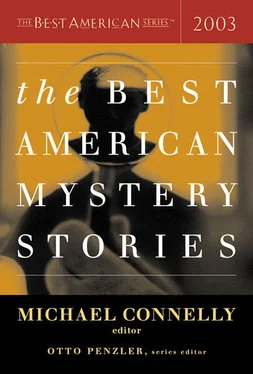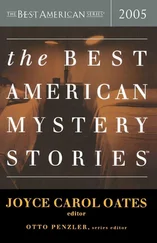“I don’t!” he screams.
She squeezes off a round that strikes Gordon in the forehead. Stepping forward, she puts two more in his head before he falls back on his bed. For good measure she empties the Beretta’s magazine, putting two more in the side of the man’s head.
She picks up all eight casings and slips them into the pocket of her coat. She leaves his Bersa under the bed. Let the police match it to the Smutt murder. Then, slowly and methodically, she tosses the place.
An hour later, she finds the six thousand in the flour container on Gordon’s kitchen counter. The giveaway — what man has fresh flour in a container?
Mr. Happer, sitting back in his captain’s chair, bats his eyes at the TV as Peter Ustinov taps out an SOS on his bathroom wall, a large cobra poised and ready to strike the rotund detective. Stella, standing at the desk’s edge in the trench coat outfit from last night, recognizes the scene and waits for David Niven to rush in with his sword to impale the snake.
When the scene’s tension dies, Mr. Happer turns his deep-set eyes to Stella and says, “Okay. You got the money?”
Stella shakes her head.
Mr. Happer’s eyes grow wide. “It wasn’t there?”
“I tore the place apart. If he had it, he stashed it.”
“Dammit!” Mr. Happer slaps a skeletonic hand on his desk. He picks up the remote control and pauses his movie. His black eyes leer at Stella’s eyes as if he can get the truth just by staring. She bites her lower lip, reaches down, and unfastens her coat. She opens it slowly as Happer’s gaze moves down her body.
Stella lets the coat fall to the floor and stands there naked except for the thigh-high stockings, which gives her long legs the silky look. Rolling her hips, Stella sits on the edge of the desk. Mr. Happer stares at her body as if mesmerized. It takes a long minute for his gaze to rise to her eyes.
“You sure you tossed the place right?”
Stella nods.
Mr. Happer picks up the remote and looks back at the TV. The riverboat is moored now, against the bank of the wide Nile River.
“Well, the word’ll get out. Make it easier later on,” Happer says. “That’s what the big boys do.”
Stella climbs off the desk and picks up her coat. As she closes it, she looks at the old man. Mr. Happer turns those black eyes to her and says, “You sure you tossed the place right?”
She’s ready, her face perfectly posed. “I’m sure.”
“Okay.” Mr. Happer looks back at the TV and mouths the words as Peter Ustinov speaks. Without looking, he opens his center desk drawer and withdraws an envelope. He slides it over to Stella, who picks it up and puts it in her purse.
“Good work,” Mr. Happer says.
“Thanks.” Stella turns and leaves him with his Ustinov and David Niven and riverboat floating down the Nile.
On her way down the stairs she looks at the dark Mississippi water and whispers a message to the dead Gordon. “So you and Mr. Happer go back a long way. Well, we go back a longer way.”
And I have tools, plenty of tools to work against this man, against all these men.
Three minutes later she spots the tail, a dark blue Olds.
From Esquire
The old man ordered the soup of the day again, homemade noodles and chicken served with bread and a glass of house wine, and wiped at his nose with his napkin the whole time he ate. It was February, and everybody on the East Coast had the flu. The old man looked like he should have been home in bed, but his habits were set deep. At ten to six every morning, for instance, he stepped out of his front door in his bathrobe and slippers to retrieve the Inquirer. Two hours later he came out again, dressed in an overcoat, and walked to the end of his block and caught the SEPTA bus to work. Twice this week he’d given his seat to young women. Exactly at one o’clock he left the store, walked the four blocks to the restaurant, and had his soup of the day and wine, always sitting at the same table near the kitchen. The tab always came to six dollars, and he always left a dollar for the waitress. She had a snake tattooed around the fleshy part of her arm, and beneath it the name Jerry was written in script.
The man who had been keeping track of the old man’s habits was named Whittemore, and he noticed the hair in his plate as soon as the waitress set it on the table. The hair lay across his fish and was anchored at one end in a little white paper cup of tartar sauce, moving slightly in the air from the overhead fan, like something dying in bed but not quite dead. He moved closer and saw that most of the hair was black, but out toward the end, away from the tartar sauce, there was a bulb of root where it was brown.
The waitress was a blonde, so the hair had come from the kitchen, which was worse in a way than if it had just belonged to the waitress herself. She had the tattoo, of course, and a stud in her nose — a small pearl — and a stained blouse, but this was the human being, after all, that they’d sent out to greet the public. Christ knew what they looked like back in the kitchen.
“Is everything all right, hon?” She came back to his table empty-handed from the other side on the way to the kitchen. Whittemore looked up and saw the back of the stud glistening inside her nose. A week ago, when he first walked in and saw the pearl, he thought it was some kind of growth.
“It’s fine,” he said.
She put a hand on her hip and he noticed her fingers. Cloudy, yellow nails, the skin itself stained dark. He wondered if she was also a photographer, had her hands in chemicals in her off-hours. Or maybe just a Camel smoker. The point was, who could eat the food after they saw her hands? He shuddered suddenly, remembering that he’d been having ideas about this same girl earlier in the week. He remembered the exact words that came into his head: She looks up for anything.
“You don’t eat much,” she said.
“Too much stress.”
She nodded, as if that made perfect sense, and then gave him a little wink “I’m the same way,” she said. “I just come in to calm my nerves.”
The old man knew he was caught and was no trouble in the parking lot or in the car on the way out of town.
His name was Eisner, and whatever he was stealing, he hadn’t been spending any of it on his clothes. He sat in the passenger seat in a suit that must have been fifty years old, wearing a bow tie and a starched white shirt, chewing Smith Brothers cough drops. They passed city hall and he cleared his throat.
“It used to be there were no skyscrapers in the whole city,” he said. “It was a local ordinance, nothing taller than the Billy Penn. That was the law.” A moment passed, and he shifted in his seat. “The place wasn’t as dark then,” he said.
A little snot teardrop glistened beneath one of the old man’s nostrils, moving up and down as he breathed, and Whittemore felt himself edging away. He tried to remember if he’d touched him in the parking lot. He wasn’t worried about the door. He’d followed him out, but he knew he’d covered his hand with his sleeve. He did that without thinking now, and he hadn’t shaken hands with anybody since his mother’s funeral. Not that it came up much anymore, but when it did, he would cough into his fist and tell whoever it was that he might be coming down with the flu. Nobody got past that, and nothing human had touched him in a long time.
They were on the parkway now, headed toward the river. Whittemore looked up and saw the art museum half a mile ahead, ancient and dead even in the sunlight; it could have been waiting for them both. The old man moved again, the air stirring with germs.
“A tan like that, you must travel a lot,” Eisner said. They passed the museum and headed west, along the Schuylkill and past the boathouses. Then he said, “Myself, I’m a creature of habit. I stay put.” And then he sneezed into his hands.
Читать дальше












